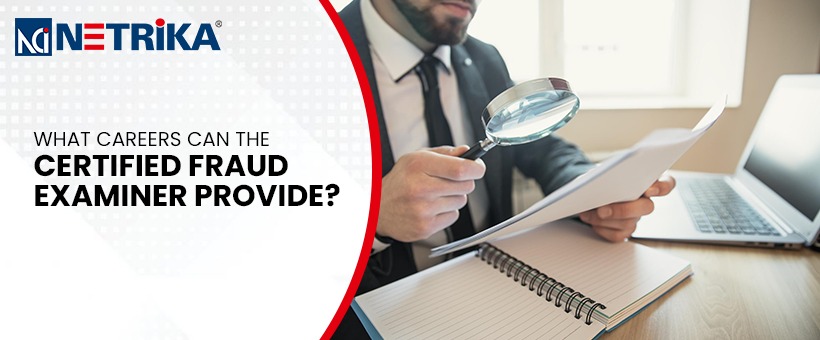
What careers can the Certified Fraud Examiner provide?
What careers can the Certified Fraud Examiner provide?
Certified Fraud Examiner (CFE)
A certified fraud examiner (CFE) is a skilled specialist who examines financial records, analyses financial transactions, and conducts forensic audits to detect fraud and other financial frauds. The Certified Fraud Examiner course certification is administered by the Association of Certified Fraud Examiners (ACFE), an independent organisation that provides anti-fraud training and establishes standards for the correct conduct of fraud investigations.
What Careers can the Certified Fraud Examiner provide?
A certified fraud examiner in India or across the globe gets various employment options in a range of businesses and has a variety of job titles, including but not limited to:
- Forensic Accountant: Forensic accountants work for public accounting firms’ forensic accounting sections, risk consulting and forensic accounting consulting businesses, lawyers, law enforcement agencies, insurance companies, government organisations, or financial institutions.
- Public Accountant: Public accountants work for companies ranging in size from small, local accounting businesses to huge, international corporations. Public accountants specialise in taxation, auditing, management, consulting, and a variety of other areas.
- Government Accountant: Government accountants work at various levels of government, including central, state, and local. Government accountants handle public finances, investigate white-collar crime, audit financial statements for government entities, and do research on new accounting challenges at the federal level. They also manage the use of local funds at the state and local levels, investigate fraud, undertake financial performance and compliance audits, and recommend corrective action as necessary.
- External Auditor: External auditors examine clients’ accounting records and express an opinion on whether financial statements are presented fairly in accordance with the applicable accounting standards. They also provide tax and advisory services in addition to auditing. Individuals, small enterprises, corporations, government agencies, and non-profit organisations can all qualify. External auditors may either work for public accounting companies or themselves.
- Internal Auditor: Internal auditors analyse the effectiveness and efficiency of a company’s operations, specifically its internal control structure, in an unbiased and objective manner. Internal auditing has a broad scope and may include operations efficiency, IT controls, financial reporting reliability, discouraging and identifying fraud, and compliance with laws and regulations. Internal auditors may also perform compliance and operational audits, identifying flaws in internal controls and ensuring that all laws and regulations are followed.
- Compliance Professional: Compliance professionals guarantee that management and employees follow company rules and processes, as well as applicable laws and regulations.
- Risk Management Professional: Professionals in risk management identify, analyse, and document the risks connected with a company’s business activities, as well as monitor the effectiveness of risk management systems and implement necessary modifications. The risk management department focuses on risks that affect the entire firm, including operational, compliance, financial, technology, and asset-related issues.
- Public-Sector Investigator: Positions under public sector investigators range from local police detectives to special agents. State and local investigators look into criminal situations and often specialise in one form of crime, such as white-collar crime or financial crime.
- Private-Sector Investigator: Private-sector investigators work in retail and warehouse security loss prevention departments, as independent or agency private investigators, or as internal or external fraud analyzers for an organisation. They gather facts and evidence to conduct inquiries into a wide range of offences. Internal fraud analysis focuses on monitoring a company’s employees, whereas external fraud analysis focuses on outside crooks.
Certified fraud examiners work at all levels of government, from city police detectives to special investigators and their job titles can differ depending on the sector and type of agency where the function is located.

